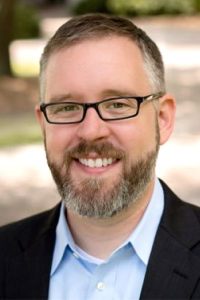First Generation – Dr. Nathan Palmer

Tell us about yourself: In this section were you involved with TRIO?
I am an assistant professor of sociology at Georgia Southern University. I earned my PhD from the University of Nebraska-Lincoln. I research how people make sense of social inequality. I was in the Upward Bound program while in high school and the McNair Program as an undergraduate. During grad school I worked for the UNL McNair Program and today I serve on the Georgia Southern McNair Advisory Board and mentor a McNair student.
Why was it like being a first-generation college student? What barriers did you face and how did you overcome them?
To be honest, while I was an undergraduate I didn’t really know that my experience was any different from anyone else’s. I assumed that everyone else was just as lost and confused as I was. I assumed everyone else was figuring out on the fly how higher education worked. I assumed everyone else thought their professors were far too important for me to interrupt them with my questions. At the time, I didn’t know what I didn’t know. It was only later, when I got into graduate school and then became faculty that I started to discover that everyone else didn’t struggle to understand the unwritten rules of higher ed.
As a first-generation student, I suffered from a lack of inherited wisdom. Unlike my 2nd generation peers who had parents who could advise and guide them through their undergraduate education, I had to figure things out on my own. And typically, I figured things out only after I had missed an important deadline or broken an unwritten rule.
What kind of support did you receive from friends and family?
My family and friends have always supported me throughout my academic career. They were always pulling for me to succeed. But one of the struggles of being a first generation student is the distance it can sometimes create between you and your family. I was having experiences and navigating through struggles that they couldn’t relate to from their own first-hand experience. At times, my academic journey was foreign to them. They loved me throughout and always tried their best to be what I needed, but sometimes I couldn’t express to them what I needed and they couldn’t relate to what I was experiencing. All that said, we figured out higher ed together. I would not be where I am today without their love and support. Whatever success I have had is a reflection of the family that I come from.
What can GS do better in supporting first-generation students?
Georgia Southern can continue to support TRiO programs. TRiO changed the course of my life and the lives of so many other first-generation students. In addition, Georgia Southern (and universities everywhere) can work to write down the unwritten rules of higher education.
Giving encouraging words to 1st generation staff and students who haven’t realized their academic dreams.
The academic paths many first-generation students take can be winding, with stops-and-starts, and occasional setbacks. It is okay if your educational experience is not like that of most of your peers. It is okay if you are not immediately successful. It is okay if you feel lost. None of those experiences mean you should drop out of school or that college isn’t for you.
Ask for help. Find mentorship wherever you can. Build relationships with other students who are committed to excelling academically. Have the audacity to dream big. Because a day will come when what makes you different, will be your competitive advantage.
Last updated: 2/10/2022
